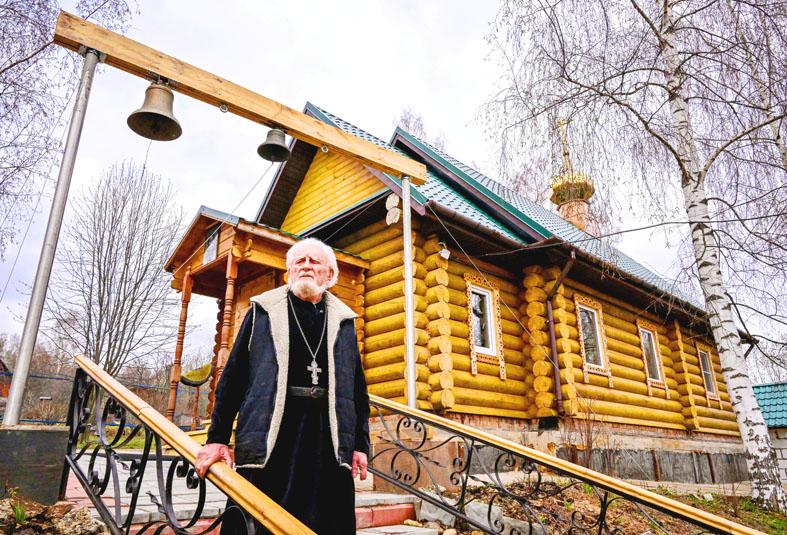Father Georgy Edelshtein is keen to debate with those who disagree with his opposition to Russia’s military campaign in Ukraine.
“I’d like to see one or two of my opponents sitting right here,” the 89-year-old said, pointing to an empty armchair in his living room full of gilded icons.
The white-bearded priest in a black cassock is one of the few Russian Orthodox priests to have spoken out against Moscow’s military operation in Ukraine.

Photo: AFP
In a quavering voice, but without hesitation, he said: “I’m afraid I am a bad priest. I’ve never been against all wars, but I’ve always been against any land-grabbing, aggressive war.”
Ukraine “is an independent state and let them build their state as they see necessary,” he said in his house in the hamlet of Novo-Bely Kamen on the banks of the River Volga in the Kostroma region, a six-hour drive from Moscow.
Since Russia launched its military action on Feb. 24, only a handful of priests from the Russian Orthodox Church led by Moscow Patriarch Kirill — which counts about 150 million believers across the world — have spoken out openly against the Kremlin’s military campaign.

Photo: AFP
Kirill has given a series of increasingly bellicose sermons, calling for Russians to “rally around” the authorities to help conquer “enemies” he accuses of trying to destroy historic unity between Russia and Ukraine.
Since he started heading the church in 2009, Kirill has sought closer ties with Russian President Vladimir Putin’s government, backing conservative values over Western liberalism.
The Russian Orthodox Church was severely restricted and under KGB control in the USSR.
Even after the 1991 collapse of the Soviet Union it has never encouraged criticism of the authorities, but some priests are nevertheless speaking out.
On Feb. 25, a day after the military operation began, Edelshtein signed a letter written by a priest friend, Father Ioann Burdin, that was posted on the Web site of Burdin’s parish church in the village of Karabanovo in the Kostroma region.
“The blood of Ukrainian residents will remain on the hands not only of the rulers of Russia and soldiers carrying out this order. Their blood is on the hands of each of us who approve this war or simply remain silent,” said the post, which was later deleted.
Metropolitan Ferapont of Kostroma, a highly placed monk, condemned the letter, saying that only two priests out of 160 in the region opposed the operation, but their protests did not stop there.
On March 6, Burdin preached about the human cost of the ongoing fighting.
The very same day he was summoned for questioning by investigators.
On March 10, he was ordered to pay a fine of 35,000 rubles (US$490.54 euros) for “discrediting” the armed forces, punishable by up to three years in prison for a repeat offense.
Four people testified against him in court.
“During the sermon, Father Burdin ... told us that he was going to pray for Ukraine,” a female parishioner said, according to court documents seen by Agence France-Presse.
Burdin, 50, continues to condemn the military action.
“For me, the commandment ‘Thou shalt not kill’ is unconditional,” he said at his house close to Kostroma.
He said few priests oppose the conflict because many are susceptible to “propaganda,” combined with the fear of sanctions and prosecution.
Burdin, who teams his black cassock with a baseball cap and has a Telegram channel, said police have photographed his house and car.
Edelshtein said that Burdin is “braver than me, I am retired.”
He did not face any state sanction for signing Burdin’s letter and had already largely retired from the church, while still allowed to hold services.
Edelshtein had a Jewish father while his mother was a Polish Catholic. He converted to Orthodoxy in 1955, hoping to escape the Soviet system.
Yet church leaders were “lackeys of the Communist regime,” he said, and “satanist” Joseph Stalin revived the current Moscow Patriarchy.
However, the two priests do not present themselves as dissidents, and in the name of church unity said that they are not calling for believers to disobey the Patriarch.
“If a person commits a personal sin, he himself rebels [against God], not the whole church with him,” Burdin said.
His recent setbacks have hit him hard, nonetheless. In early April he withdrew from active service and is thinking about whether to stay in the church.
The son of a priest, he was ordained in 2015 after a career in journalism.
“If I’m within the church, but censoring myself as I speak, if I’m silent about a sin being a sin and about bloodshed being unacceptable, then I will just gradually, without noticing, stop being a pastor,” he said.

BRUSHED OFF: An ambassador to Australia previously said that Beijing does not see a reason to apologize for its naval exercises and military maneuvers in international areas China set off alarm bells in New Zealand when it dispatched powerful warships on unprecedented missions in the South Pacific without explanation, military documents showed. Beijing has spent years expanding its reach in the southern Pacific Ocean, courting island nations with new hospitals, freshly paved roads and generous offers of climate aid. However, these diplomatic efforts have increasingly been accompanied by more overt displays of military power. Three Chinese warships sailed the Tasman Sea between Australia and New Zealand in February, the first time such a task group had been sighted in those waters. “We have never seen vessels with this capability

A Japanese city would urge all smartphone users to limit screen time to two hours a day outside work or school under a proposed ordinance that includes no penalties. The limit — which would be recommended for all residents in Toyoake City — would not be binding and there would be no penalties incurred for higher usage, the draft ordinance showed. The proposal aims “to prevent excessive use of devices causing physical and mental health issues... including sleep problems,” Mayor Masafumi Koki said yesterday. The draft urges elementary-school students to avoid smartphones after 9pm, and junior-high students and older are advised not

Philippine President Ferdinand Marcos Jr has fired his national police chief, who gained attention for leading the separate arrests of former Philippine president Rodrigo Duterte on orders of the International Criminal Court and televangelist Apollo Carreon Quiboloy, who is on the FBI’s most-wanted list for alleged child sex trafficking. Philippine Executive Secretary Lucas Bersamin did not cite a reason for the removal of General Nicolas Torre as head of the 232,000-member national police force, a position he was appointed to by Marcos in May and which he would have held until 2027. He was replaced by another senior police general, Jose

POWER CONFLICT: The US president threatened to deploy National Guards in Baltimore. US media reports said he is also planning to station troops in Chicago US President Donald Trump on Sunday threatened to deploy National Guard troops to yet another Democratic stronghold, the Maryland city of Baltimore, as he seeks to expand his crackdown on crime and immigration. The Republican’s latest online rant about an “out of control, crime-ridden” city comes as Democratic state leaders — including Maryland Governor Wes Moore — line up to berate Trump on a high-profile political stage. Trump this month deployed the National Guard to the streets of Washington, in a widely criticized show of force the president said amounts to a federal takeover of US capital policing. The Guard began carrying